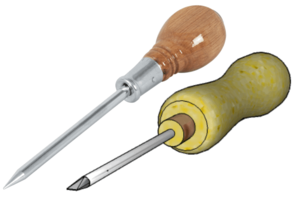Awl and Bradawl: Difference between revisions
From DT Online
(Created article) |
|||
| Line 10: | Line 10: | ||
When using a '''Bradawl''' the cutting edge is first placed across the [https://en.wikipedia.org/wiki/Wood_grain '''Grain'''] of timber to cut the fibres and rotated backwards and forwards to produce small holes suitable for nails or to start screws. | When using a '''Bradawl''' the cutting edge is first placed across the [https://en.wikipedia.org/wiki/Wood_grain '''Grain'''] of timber to cut the fibres and rotated backwards and forwards to produce small holes suitable for nails or to start screws. | ||
<div class="buyers-guide"> | |||
=====DT Online Buyers' Guide===== | |||
</div> | |||
{| | {| | ||
|- | |- | ||
Revision as of 15:53, 14 May 2016
Description
The Awl is a small hand-held tool with a sharpened point. A Bradawl is similar but is flattened at its tip to produce a sharp chisel edge.
Features and Uses
A woodworker might use an Awl to scratch lines along the Grain of timber in much the same way as a metalworker would use a Scriber - (a Marking Knife would be used across the Grain). They are used also to pierce holes in materials such as leather or canvas when stitching for example.
When using a Bradawl the cutting edge is first placed across the Grain of timber to cut the fibres and rotated backwards and forwards to produce small holes suitable for nails or to start screws.
DT Online Buyers' Guide
 |
 |
 |
 |
 |
| Silverline 675172 Round Point Awl 40 mm |
Draper 64747 Carpenters Awl |
Draper 76481 Expert Carpenters Awl |
Draper Soft Grip Bradawl 40mm |
Bradawl 0-69-014 by Stanley |
